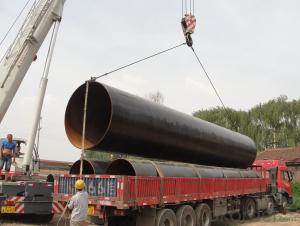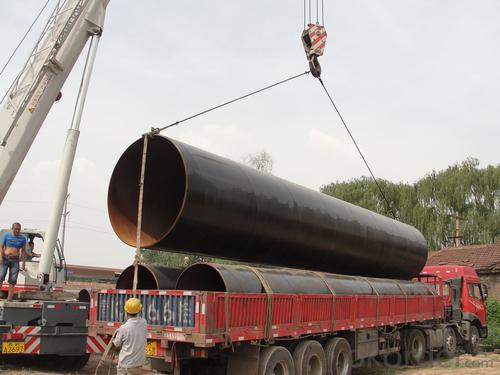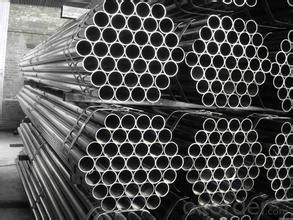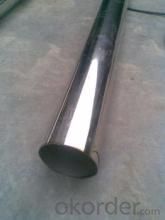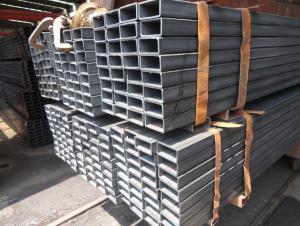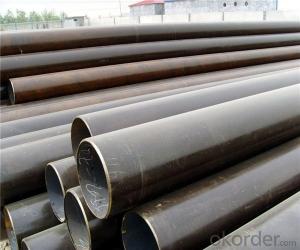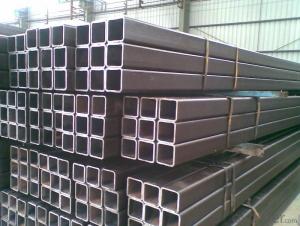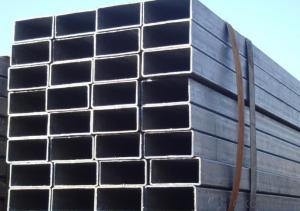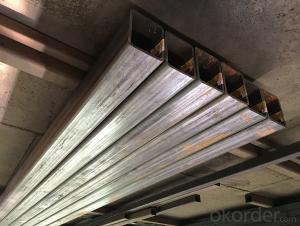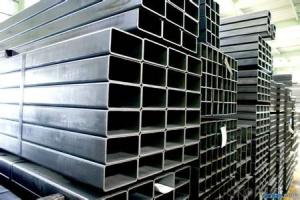API Carbon Steel Tube With High Quality
- Loading Port:
- China main port
- Payment Terms:
- TT or LC
- Min Order Qty:
- 100 m.t.
- Supply Capability:
- 10000 m.t./month
OKorder Service Pledge
OKorder Financial Service
You Might Also Like
1、Structure of Seamless Pipe ASTM A106/53:
Seamless pipe is formed by drawing a solid billet over a piercing rod to create the hollow shell. Because the manufacturing process does not include any welding, seamless pipes are perceived to be stronger and more reliable.
2、Main Features of the Seamless Pipe ASTM A106/53:
• High manufacturing accuracy
• High strength
• Strong heat dissipation ability
• Good visual effect
3、Seamless Pipe ASTM A106/53 Specification:
Standard | GB, DIN, ASTM ASTM A106-2006, ASTM A53-2007 |
Grade | 10#-45#, 16Mn 10#, 20#, 45#, 16Mn |
Thickness | 8 - 33 mm |
Section Shape | Round |
Outer Diameter | 133 - 219 mm |
Place of Origin | Shandong, China (Mainland) |
Secondary Or Not | Non-secondary |
Application | Hydraulic Pipe |
Technique | Cold Drawn |
Certification | API |
Surface Treatment | factory state or painted black |
Special Pipe | API Pipe |
Alloy Or Not | Non-alloy |
Length | 5-12M |
Outer Diameter | 21.3-610mm |
Grade | 20#, 45#, Q345, API J55, API K55, API L80, API N80, API P110, A53B |
Standard | ASME, ASTM |
4、Packaging & Delivery
Packaging Details: | seaworthy package,bundles wrapped with strong steel strip |
Delivery Detail: | 15-30days after received 30%TT |
5、FAQ of Seamless Pipe ASTM A106/53:
①How is the quality of your products?
Our products are manufactured strictly according to national and internaional standard, and we take a test on every pipe before delivered out. If you want see our quality certifications and all kinds of testing report, please just ask us for it.
Guaranteed: If products’ quality don’t accord to discription as we give or the promise before you place order, we promise 100% refund.
②How about price?
Yes, we are factory and be able to give you lowest price below market one, and we have a policy that “ for saving time and absolutely honest business attitude, we quote as lowest as possible for any customer, and discount can be given according to quantity”,if you like bargain and factory price is not low enough as you think, just don’t waste your time.Please trust the quotation we would give you, it is professional one.
Any question, pls feel free to contact us !
6、Seamless Pipe ASTM A106/53 Images:
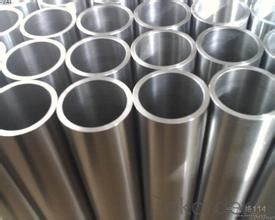
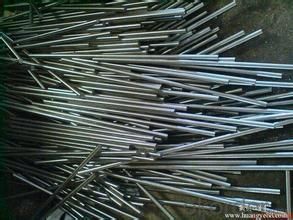
- Q: Can steel pipes be used for water wells?
- Yes, steel pipes can be used for water wells. Steel pipes are commonly used for constructing water wells due to their durability, strength, and resistance to corrosion. They can withstand high water pressure and provide a reliable and long-lasting solution for accessing underground water sources.
- Q: Which is more load-bearing, the same thickness of steel pipe and steel bar?
- The same length, the same pipe diameter, the same material strength is hollow, the ratio of area of steel (solid), and the cyclical and slender radius smaller than the larger, so the longitudinal stability coefficient is smaller, three factors, two factors are weak in steel reinforced, another factor: strength, they are the same, no doubt, steel reinforced bearing less than.
- Q: Are steel pipes suitable for underground compressed air systems?
- Generally, steel pipes are suitable for underground compressed air systems. They are a popular choice due to several advantages they possess. First and foremost, steel pipes are renowned for their strength and durability. This enables them to withstand the pressure and stress associated with compressed air systems. They can handle high operating pressures without the risk of bursting or leaking. Secondly, steel pipes exhibit excellent resistance to corrosion. They can endure exposure to moisture, soil, and other elements found underground. This reliability makes them ideal for underground installations where pipes may encounter potentially corrosive substances. Moreover, steel pipes are relatively easy to install and maintain. They can be securely connected through welding or threading, ensuring a leak-free connection. Additionally, inspecting and repairing steel pipes is a simple process, allowing for cost-effective maintenance and repairs. Nevertheless, it is important to consider other factors that may impact the suitability of steel pipes for underground compressed air systems, such as specific requirements and conditions. Consulting a professional engineer or qualified expert is advisable to determine the most appropriate choice for a particular application.
- Q: Can steel pipes be used for plumbing?
- Yes, steel pipes can be used for plumbing. They are commonly used in commercial and industrial applications due to their durability and strength. However, they are less common in residential plumbing due to their higher cost and the availability of alternative materials such as copper and PVC.
- Q: Can steel pipes be used for mining applications?
- Indeed, mining applications do permit the utilization of steel pipes. The mining industry frequently employs steel pipes for diverse objectives. Specifically, they are commonly utilized for the conveyance of fluids, such as water or slurry, during mining operations. Steel pipes possess remarkable attributes, including durability, strength, and resistance to corrosion, rendering them suitable for the demanding and corrosive underground mining environments. They have the ability to endure high pressure and effectively manage the substantial loads associated with mining applications. Furthermore, the ease with which steel pipes can be welded and connected facilitates efficient installation and maintenance. Considering all factors, steel pipes prove to be a reliable and economically sound option for mining applications.
- Q: How are steel pipes used in the manufacturing of oil refineries?
- Steel pipes are used extensively in oil refineries for various purposes. They are primarily used for transporting crude oil, refined petroleum products, and various chemicals within the refineries. These pipes are also crucial for the distribution of water, steam, and other fluids required for the refining processes. Additionally, steel pipes are used in the construction of various equipment and structures in oil refineries, including storage tanks, heat exchangers, and process units. Overall, steel pipes play a vital role in ensuring the safe and efficient operation of oil refineries.
- Q: How are steel pipes tested for pressure and leakage?
- Steel pipes are tested for pressure and leakage through various methods including hydrostatic testing, pneumatic testing, and ultrasonic testing. Hydrostatic testing involves filling the pipe with water and applying pressure to check for any leaks or weaknesses. Pneumatic testing involves using compressed air instead of water. Ultrasonic testing uses high-frequency sound waves to detect any flaws or defects in the pipe material. These testing methods ensure that steel pipes meet the required standards for pressure and leakage resistance.
- Q: Are steel pipes resistant to chemicals and corrosion?
- Generally speaking, steel pipes possess a high resistance to chemicals and corrosion. To further enhance this resistance, protective layers such as zinc or epoxy are often applied to steel pipes. These coatings serve as a barrier, preventing direct contact between chemicals and the steel, thus reducing the risk of corrosion. Moreover, steel itself possesses inherent corrosion-resistant properties, making it a suitable material for applications where exposure to chemicals and corrosive elements is common. However, it is worth noting that the level of resistance may vary depending on the specific type of steel, the chosen coating, and the particular chemicals or corrosive substances involved. Therefore, it is advisable to seek advice from experts and carefully consider the specific requirements of the intended application to ensure the appropriate selection of steel and protective measures, thereby maximizing resistance to chemicals and corrosion.
- Q: Do steel pipes require maintenance?
- Maintenance is necessary for steel pipes. Despite their durability and long lifespan, steel pipes can still experience wear and tear over time. To ensure optimal performance and extend their lifespan, regular maintenance is crucial. Inspecting the pipes for damage or corrosion is an important part of maintenance. Rust and corrosion can affect steel pipes, especially in high humidity or water-exposed environments. Regular inspections enable early detection of any problems, preventing more extensive damage and costly repairs in the future. Cleaning the pipes is another maintenance task. Over time, debris, sediment, or mineral deposits can accumulate in steel pipes. These build-ups can restrict fluid flow or impact the quality of transported materials. Regular cleaning removes these obstructions and maintains pipe efficiency. Periodic lubrication or coating may be necessary depending on the pipe's use. Lubricants and coatings reduce friction, prevent corrosion, and enhance durability. During maintenance, these can be applied to ensure smooth functioning and resistance to corrosion. In summary, regular maintenance is vital for steel pipes to maximize performance, prevent damage, and extend their lifespan. By investing time and effort in maintenance, potential issues can be identified and addressed early on, ultimately saving time and money in the long term.
- Q: What are the common factors affecting the lifespan of steel pipes?
- The common factors affecting the lifespan of steel pipes include corrosion, external damage or impact, poor installation or maintenance practices, and exposure to extreme temperatures or harsh environments.
Send your message to us
API Carbon Steel Tube With High Quality
- Loading Port:
- China main port
- Payment Terms:
- TT or LC
- Min Order Qty:
- 100 m.t.
- Supply Capability:
- 10000 m.t./month
OKorder Service Pledge
OKorder Financial Service
Similar products
Hot products
Hot Searches
Related keywords
